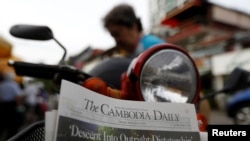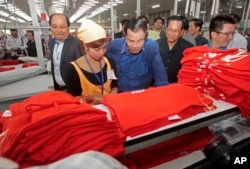Cambodian journalist Aun Pheap used to be a dedicated reporter. He would chase stories for The Cambodia Daily, a local independent paper, and write articles that government officials, businessmen and other powerful players would rather not see published.
Things radically changed in May 2017 when he and his Canadian colleague, Zsombor Peter, an associate editor at the paper, went to Ratanakkiri in the kingdom's north to report on the only commune in the province in which the opposition party had won a commune chief position in 2012.
They wanted to assess whether and how the situation had changed, and find out whether villagers would most likely vote for the opposition party again during the commune elections in June 2017.
While they were reporting, though, authorities ordered them to leave, saying the two lacked permission to be there. Insisting on their right of press freedom, the two continued to do their job.
'Just exercising our rights'
"We [were] just exercising our rights. We are reporters, so we are not required to submit our letter with the authorities," Aun Pheap told VOA.
Aun Pheap said he suspected that local authorities had long been unhappy with stories he reported about illegal logging. Aun Pheap and Peter had won the 2017 Excellence in Investigative Reporting award from the Society of Publishers for an investigation into the military's involvement in illegal trade.
In August 2017, they were charged with incitement. Aun Pheap left the country a few weeks later and has not returned.
Seeking asylum in US
After spending five months in Thailand, where the United Nations refugee agency, UNHCR, recognized him as a refugee, Aun Pheap went to the United States. His asylum application is pending, he said.
Reflecting on press freedom in Cambodia, Aun Pheap described the situation in the country as dire.
"If someone criticizes the government, then they use a trick. They say, 'Oh, this newspaper has no professional [attitude],' then they shut it down. So now there is not any independent newspaper in Cambodia," he said.
The Cambodia Daily was forced to shut down. Its rival, The Phnom Penh Post, was sold to an investor with ties to the government. Additionally, more than 30 radio stations went off the air, and journalists were arrested. In the World Press Freedom Index, the country fell to a rank of 143 out of 180 countries.
Many commentators attributed what they termed a crackdown on the free press to national elections held last July, and Aun Pheap said not much has changed since then.
"The government still puts pressure, still intimidates the local people if they want to give opinions," he said.
Asked how he foresaw developments over the next few years, Aun Pheap said he didn't believe the situation would improve.
"Worse. It's going [to become] worse. Worse and worse," he said. "I don't think it's going [to be] better, because the prime minister, Hun Sen, right now, he's still running the government. And after he becomes old, he plans to transfer the power to his son. So if the power is going to his son, nothing changes. ... I have no hope that Cambodia is going to be better in the future."
Huy Vannak, a government official at the Interior Ministry and head of the Union of Journalist Federations of Cambodia, said journalists enjoyed press freedom as long as they remained professional.
"[For example], they keep using the word, when they refer to the royal government of Cambodia, they call it, 'Hun Sen regime,' " he said. "It is rude. ... For Cambodian culture, it is immoral, it is hate speech and it is incitement."
'Clampdown' on journalism
The Committee to Protect Journalists' Southeast Asia representative, Shawn Crispin, described the charges against Aun Pheap in the context of an "ongoing clampdown on free media and independent journalists."
In an email to VOA, Crispin said, "The incitement charges filed against him and his colleague aimed to stifle reporting on the now-banned political opposition. The charges are bogus and underscore the lack of judicial independence under Prime Minister Hun Sen's ruling Cambodian People's Party."
Huy Vannak rejected the accusations and said it was merely a matter of respecting other people's rights.
"Your freedom has a border. I don't think you can use your freedom to violate dignity," he said. By way of example, he said that calling Hun Sen, who lost an eye in a battle during the 1970s, a "one-eyed prime minister" was "immoral" and did not fall under press freedom.





